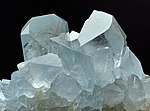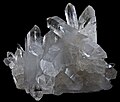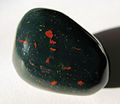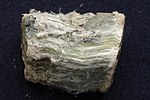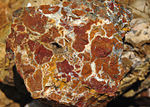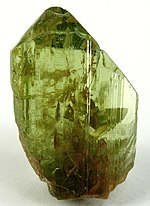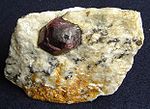In mineralogy, an inclusion is any material trapped inside a mineral during its formation. In gemology, it is an object enclosed within a gemstone or reaching...
5 KB (471 words) - 20:04, 23 September 2024
non-disabled students Inclusion (mineral), any material that is trapped inside a mineral during its formation Inclusion bodies, aggregates of stainable...
2 KB (257 words) - 10:17, 27 March 2023
A fluid inclusion is a bubble of liquid and/or gas that is trapped within a crystal. As minerals often form from a liquid or aqueous medium, tiny bubbles...
12 KB (1,336 words) - 20:58, 23 September 2024
materials can be other minerals or fluids like water. Since diamonds have high strength and low reactivity with either the inclusion or the volcanic host...
23 KB (2,184 words) - 07:56, 15 April 2024
are not considered minerals, even though they are often found as inclusions in other minerals; but water ice is considered a mineral. It must have a well-defined...
109 KB (13,007 words) - 08:41, 16 October 2024
spar, desert rose, and gypsum flower are crystal habit varieties of the mineral gypsum. All varieties of gypsum, including selenite and alabaster, are...
19 KB (1,932 words) - 22:07, 29 September 2024
Halite (redirect from Mineral salt)
salt, is a type of salt, the mineral (natural) form of sodium chloride (NaCl). Halite forms isometric crystals. The mineral is typically colorless or white...
15 KB (1,518 words) - 08:48, 15 October 2024
chlorite. The most common inclusion mineral in micas is magnetite, but generally the inclusions are rare. Some zircon inclusions can also be found. The dolomite...
23 KB (3,035 words) - 06:52, 19 May 2024
associated with the minerals gypsum, anhydrite, and halite. On occasion in some localities, it may also be found with sulfur inclusions. The mineral is found worldwide...
9 KB (735 words) - 17:28, 24 July 2024
newer units will be above older units, except in cases of inversion. Carbon dating Geochronology Igneous intrusion Inclusion (mineral) Smith's laws v t e...
875 bytes (62 words) - 23:58, 23 July 2023
Lustre (mineralogy) (redirect from Mineral lustre)
occurs in minerals containing a great abundance of microscopic inclusions, with examples including opal and cordierite, jadeite. Many minerals with a greasy...
12 KB (1,158 words) - 10:42, 16 October 2024
quartzite, characterised by its translucency and the presence of platy mineral inclusions that give it a shimmering or glistening effect termed aventurescence...
3 KB (429 words) - 16:36, 9 June 2024
medium. Mineral wool is also known as mineral cotton, mineral fiber, man-made mineral fiber (MMMF), and man-made vitreous fiber (MMVF). Specific mineral wool...
21 KB (2,656 words) - 22:11, 6 July 2024
reheating a melt inclusion to its original melt temperature and then rapidly quenching to form a homogenous glass phase free of daughter minerals or vapor bubbles...
26 KB (2,897 words) - 13:28, 2 March 2024
Quartz (redirect from Citrine (mineral))
structure. Blue quartz contains inclusions of fibrous magnesio-riebeckite or crocidolite. Inclusions of the mineral dumortierite within quartz pieces...
61 KB (5,745 words) - 08:42, 31 October 2024
Chalcedony (redirect from Plasma (mineral))
of very fine intergrowths of quartz and moganite. These are both silica minerals, but they differ in that quartz has a trigonal crystal structure, while...
18 KB (1,845 words) - 19:56, 3 May 2024
Aleutite (category Monoclinic minerals)
Aleutite is both a vanadate and arsenate mineral but it can also be considered as a natural salt-inclusion phase that was first discovered at Second scoria...
7 KB (655 words) - 07:45, 14 January 2024
The mineral aggregate heliotrope (from Ancient Greek ἥλιος (hḗlios) 'sun' and τρέπειν (trépein) 'to turn'), also called Indian bloodstone or ematille...
7 KB (717 words) - 17:19, 29 October 2024
Chrysotile (category Magnesium minerals)
soft, fibrous silicate mineral in the serpentine subgroup of phyllosilicates; as such, it is distinct from other asbestiform minerals in the amphibole group...
25 KB (2,270 words) - 21:45, 8 September 2024
Jasper (redirect from Jasper (mineral))
of microgranular quartz and/or cryptocrystalline chalcedony and other mineral phases, is an opaque, impure variety of silica, usually red, yellow, brown...
19 KB (1,734 words) - 08:52, 10 October 2024
as the Minister for Mineral Resources. During other periods, the mineral resources portfolio has been enlarged by the inclusion of energy: there was...
12 KB (631 words) - 07:17, 22 August 2024
Beverly the Bug, the first known example of an opal with an insect inclusion Minerals portal Biogenic silica Cacholong – variety of opalPages displaying...
56 KB (5,837 words) - 11:53, 17 September 2024
Peridot (category Silicate minerals)
Silky and rod-like inclusions are common in Pakistani peridots. The most common mineral inclusion in peridot is the chromium-rich mineral chromite. Magnesium-rich...
17 KB (1,679 words) - 13:13, 2 September 2024
calcium–aluminium-rich inclusion or Ca–Al-rich inclusion (CAI) is a submillimeter- to centimeter-sized light-colored calcium- and aluminium-rich inclusion found in...
4 KB (432 words) - 13:22, 28 November 2023
Sylvite (category Potassium minerals)
Sylvite, or sylvine, is potassium chloride (KCl) in natural mineral form. It forms crystals in the isometric system very similar to normal rock salt,...
5 KB (367 words) - 23:08, 22 February 2024
poikiloblast is a porphyroblast mineral with small inclusions of the previous rock in it. From the texture (if any) shown in the inclusion, the deformation history...
648 bytes (66 words) - 07:32, 29 October 2024
Pyrope (category Magnesium minerals)
The mineral pyrope is a member of the garnet group. Pyrope is the only member of the garnet family to always display red colouration in natural samples...
7 KB (575 words) - 03:42, 27 May 2024
Blödite (category Sulfate mineral stubs)
magnesium sulfate mineral with the formula Na2Mg(SO4)2·4H2O. The mineral is clear to yellow in color often darkened by inclusions and forms monoclinic...
3 KB (137 words) - 20:55, 17 January 2024
heating the surrounding molecular cloud. 60 new minerals were produced and were preserved as inclusions in chondrites. The accretion of dust into asteroids...
45 KB (5,027 words) - 05:47, 24 August 2024
rock[citation needed]. If a porphyroblastic mineral has small inclusions of minerals within it, the mineral is described as poikiloblastic. This observation...
4 KB (470 words) - 23:08, 1 February 2024








